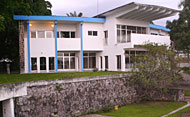KINSHASA....The initial vision for the Carter Center's Human Rights House was to provide both a space and forum for human rights activists in the Democratic Republic of the Congo, building on the momentum of the 2006 elections.
However, almost two years on, the place--and the program--has expanded to support a much broader range of activities, which are strengthening the voices and impact of civil society organizations in this nation struggling in the aftermath of prolonged conflict and authoritarian rule. The 2006 elections were the nation's first free elections in 40 years.
"We're putting a lot of energy into supporting civil society because that's the essential 'Fourth Estate' in this context, just as essential as the media, which is the traditional sense of the term. Building--not rebuilding--a nation traumatized by colonialism, dictatorship, and war requires a strong and vibrant citizenry to hold the government accountable for its conduct," Karin Ryan, director of the Carter Center's Human Rights Program.
Located in the capital city of Kinshasa and staffed primarily by Congolese nationals, Human Rights House--begun in late 2007--provides quality training and technical support to 73 NGO partners in the areas of project design, financial management and fundraising, investigating human rights violations, conflict resolution, and advocacy. Special projects to date have focused on the fairness of mining contracts and training police officers in human rights issues and practices. Read more about training for Congolese police officers
But there is much more to be done.
"The situation in the Congo is perhaps the most dire of any place on the planet," said Ryan. "It is going to require a sustained and coordinated international effort to help the people of the Congo get onto a solid footing for the country's future."
Moving forward, Human Rights House will focus on advancing human rights by strengthening social, legal, and economic justice. An example is its work to review the fairness of national mineral rights.
Although the DRC is one of the most mineral-rich nations in the world, with vast fields of diamonds, oil, gold, coal, copper, and tin, the country's extraction and sale of these minerals have not benefited the Congolese people and have, in fact, been at the center of the DRC's devastation.
"Congo's resources have been plundered and stolen, and have caused horrific wars that in recent years led to the deaths of an estimated five million people," Ms Ryan said. "The government must appropriately and fairly regulate the extraction of minerals and distribution of the revenues for people to benefit. So far, that hasn't happened, so we are increasing our focus on civil society's role in monitoring these issues.
"Previously we worked with the DRC government in its own efforts to renegotiate its mining contracts. But, while the government did take some important steps, the process has failed so far to produce desired results, so we shifted to civil society as an avenue for change. The voices of the Congolese themselves are what matters most. We want to support their efforts to hold their government accountable.'' Read the Carter Center's statement on mining contracts
A peaceful future in the DRC, Ms. Ryan said, depends on building and strengthening the institutions of democracy, which will probably take decades.
"My hope is that the government will take the needed steps to put the country on a sure footing toward greater transparency, better governance, and access to justice for the people of the Congo. It has to overcome the chain of legacies that have kept the country bound to endless suffering," she said, adding that, "there must be a strong and assertive judicial system, sustainable and fair extraction of natural resources, and a well-trained security sector so that the people can finally feel safe."
To that end, The Carter Center--through the Human Rights House--will continue to support the people of the Democratic Republic of the Congo in their quest for a just society.
"The Carter Center played a vital role during the elections of 2006, and is still viewed as a trusted international partner," Ms. Ryan said. "We would like to accompany the people of the Congo as long as we can be of assistance."

Carter Center Photos
(Click to enlarge)
Human Rights House includes an IT center and library where Congolese leaders and students can access numerous human rights publications, training modules, and engage in networking with the other human rights communities in the DRC and other parts of Africa.
Members of an NGO meet at Human Rights House to develop a human rights education campaign for the DRC.
Boris Nzanga (left), Human Rights House staff member, joins NGO partner Jean Mufuta (center) and 2008 intern Paulphine Soki (right) during a training event.
Action Contre Les Violations Des Droits Des Personnes Vulnerables (Action Against Human Rights Violations of Vulnerable Persons), a Human Rights House partner, works for public awareness activities against public corruption, prevention of sexual violence through education on new laws criminalizing rape, and direct assistance to rape victims through referrals to free attorneys and health clinics in their network.
Meet Valerie Harden, deputy field director, Kinshasa field office
Learn more about the Carter Center's work in the Democratic Republic of the Congo
Please sign up below for important news about the work of The Carter Center and special event invitations.